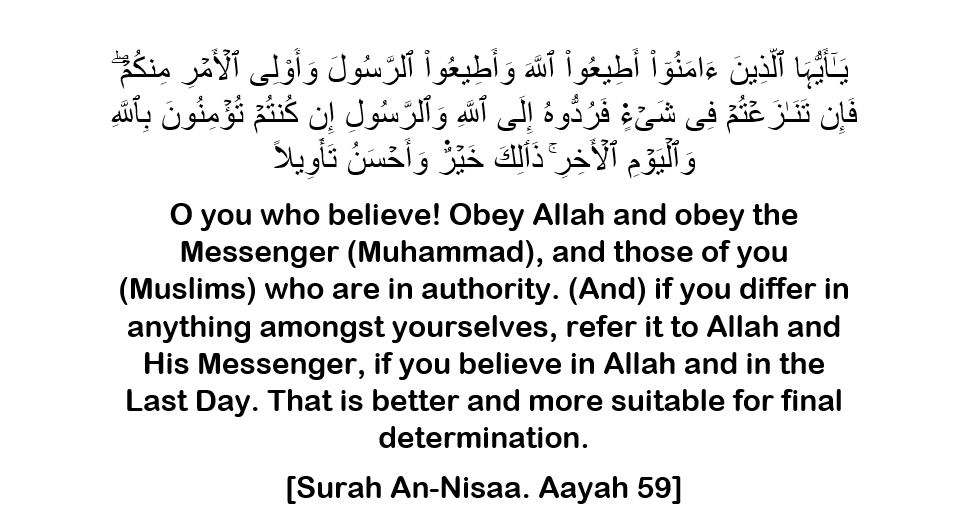In The Name of Allaah, The Most Merciful, The Bestower of Mercy
Allaah [The Most High] said:
وَجَعَلْنَا بَعْضَكُمْ لِبَعْضٍ فِتْنَةً أَتَصْبِرُونَ
And We have made some of you as a trial for others; will you have patience?
[Soorah Al-Furqaan Aayah 20]
Imaam Ibnul Qayyim [rahimahullaah] said:
This is universal among all the creation- they are put to trial by way of one another. Those whom the Messengers are sent to are a trial for the Messengers when calling to them to the truth, exercising patience in facing their harm and bearing the difficulties faced when conveying Allaah’s Message. And the Messengers are a trial for those whom they have been sent to, with regards to whether those people will obey and aid the Messengers, testify to the truth of that which the Messengers have been sent with, or whether they will disbelieve, reject and fight the Messengers.
The ignorant people are a trial for the scholars with regards to whether they will teach and advise them, whilst exercising patience in teaching, advising, guiding them and been constant in that. And the scholars are a trial for the ignorant people with regards to whether they will obey them and follow their example.
The subjects are a trial for the kings and the kings are a trial for the subjects. The poor people are a trial for the rich people and the rich people are a trial for the poor people. The weak people are a trial for the strong people and the strong people are a trial for the weak people. The leaders are put to trial by those who follow them and those who follow are put to trial by way of the leaders. The slave master is put to trial by way of his slaves and the slaves are put to trial by way of the slave master. A man is put to trial by way of his wife and his wife is put to trial by way of him. The men are put to trial by way of women and women are put to trial by way of men. The believers are put to trial by way of the disbelievers and the disbelievers are put to trial by way of the believers. Those who enjoin good and forbid evil are put to trial by way of those whom they command good and forbid from evil, and those commanded with good and forbidden from evil are put to trial by way of those who command them with good and forbid them from evil.
And due to this, the poor and weak Muslims amongst the followers of the Messengers were a trial for the wealthy people and leaders. They [i.e. these wealthy ones and leaders] were prevented from accepting Eemaan after knowing the truthfulness of the Messengers. [Allaah informed us that they said]:
لَوْ كَانَ خَيْرًا مَا سَبَقُونَا إِلَيْهِ
“Had it (i.e. the Message of the Messenger) been a good thing, they (weak and poor) would not have preceded us thereto!” [Soorah Al-Ahqaaf: Ayah: 11]
And (Allaah said that) they (i.e. disbelievers in the time of Nooh) said to Nooh:
أَنُؤْمِنُ لَكَ وَاتَّبَعَكَ الْأَرْذَلُونَ
“Shall we believe in you, when the lowest of the people follow you? (i.e. those without wealth or status in society)”
[Soorah Ash-Shu’araa: Ayah: 111]
Allaah (The Most High) said:
وَكَذَٰلِكَ فَتَنَّا بَعْضَهُمْ بِبَعْضٍ لِيَقُولُوا أَهَٰؤُلَاءِ مَنَّ اللَّهُ عَلَيْهِمْ مِنْ بَيْنِنَا
‘’Thus We have tried some of them with others, that they might say: “Is it these (poor believers) that Allah has favoured from amongst us?” [Soorah Al-An’aam: Ayah: 53]
So when a leader of high status saw that a poor person of lowly status had preceded him in belief and in following the Messenger [sallal-laahu-alayhi-wasallam], he become furious and scornful about accepting Islaam [due to not wanting] to be similar to [that poor person of lowly status]. And he says: I enter into Islaam so that I may be at the same level with this lowly one?
Az-Zujaaj [rahimahullaah] said: Perhaps a person of high status wanted to accept Islaam, but he was prevented from it so that it would not be said: ‘’someone lower than him preceded him (in Islaam);’’ therefore he remained upon disbelief and not [wanting] a Muslim to precede him in virtue.
And the reason behind [the fact that] some people are a trial for others is that the poor person may say, ‘’Why am I not like the rich person?” And the weak person may say, ‘’Why am I not like the strong one?’’ And the one afflicted may say, ‘’Why am I not like the one upon well-being.’’
[Allaah (The Most High) said] that the disbelievers said:
لَنْ نُؤْمِنَ حَتَّىٰ نُؤْتَىٰ مِثْلَ مَا أُوتِيَ رُسُلُ اللَّهِ
“We shall not believe until we receive the like of that which the Messengers of Allah had received”
[Soorah Al-An’aam: Ayah: 124]
This ayah was revealed concerning the trial encountered by the idol worshippers due to the poor immigrants, such as Bilaal, khabbaab, Suhaib, Abu Dar, Ibn Mas’ood and Ammaar [radiyallaahu-anhum], for they [idol worshippers] used to say: ‘’Look at these ones that follow Muhammad and they are from our lowly ones and those under our service.”
Allaah [The Most High] said:
إِنَّهُ كَانَ فَرِيقٌ مِنْ عِبَادِي يَقُولُونَ رَبَّنَا آمَنَّا فَاغْفِرْ لَنَا وَارْحَمْنَا وَأَنْتَ خَيْرُ الرَّاحِمِينَ
فَاتَّخَذْتُمُوهُمْ سِخْرِيًّا حَتَّىٰ أَنْسَوْكُمْ ذِكْرِي وَكُنْتُمْ مِنْهُمْ تَضْحَكُونَ
إِنِّي جَزَيْتُهُمُ الْيَوْمَ بِمَا صَبَرُوا أَنَّهُمْ هُمُ الْفَائِزُونَ
‘’Verily! There was a party of My slaves, who used to say: “Our Lord! We believe, so forgive us, and have mercy on us, for You are the Best of all who show mercy!” But you took them for a laughingstock, so much so that they made you forget My Remembrance while you used to laugh at them! Verily! I have rewarded them this Day for their patience, they are indeed the ones that are successful.’’ [Soorah Al-Muminoon: Aayaat: 109-111]
So Allaah informed (us) that He rewarded them for their patience, just as He (The Most High) said:
وَجَعَلْنَا بَعْضَكُمْ لِبَعْضٍ فِتْنَةً أَتَصْبِرُونَ
‘’And We have made some of you as a trial for others: will you have patience?’’
Az-Zujaaj (rahimahullaah) said: This means: Will you not exercise patience when afflicted and indeed you know what the patient ones will receive?! I [Ibnul Qayyim] say: Allaah [The Glorified One free from all imperfections] bounded affliction with patience in this ayah and also in His saying: [ثُمَّ إِنَّ رَبَّكَ لِلَّذِينَ هَاجَرُوا مِنْ بَعْدِ مَا فُتِنُوا ثُمَّ جَاهَدُوا وَصَبَرُوا -Then, verily! Your Lord for those who emigrated after they had been put to trials and thereafter strove hard and fought (for the Cause of Allah) and were patient” [Soorah An-Nahl: Ayah: 110]
There is no remedy like patience for the one put to trial! If he exercises patience, then that trial becomes a (source) of purification and rescue from sins, just as the bellows purifies gold and silver. Trials are the bellows of the hearts and the test for one’s Eemaan, and by way of it the truthful one is distinguished from the liar. Allaah [The Most High] said:
وَلَقَدْ فَتَنَّا الَّذِينَ مِنْ قَبْلِهِمْ ۖ فَلَيَعْلَمَنَّ اللَّهُ الَّذِينَ صَدَقُوا وَلَيَعْلَمَنَّ الْكَاذِبِينَ
‘’And We indeed tested those who were before them. And Allah will certainly make (it) known (the truth of) those who are true, and will certainly make (it) known (the falsehood of) those who are liars, (although Allah knows all that before putting them to test).’’ [Soorah Al-Ankabut: Ayah: 3]
Trials categorise the people into truthful ones and liars, believers and hypocrites, good and wicked. So whoever exercises patience in facing trials, then this is a mercy for him and a safety from a greater trial due to his patience. And whoever does not exercise patience in facing a trial will fall into a trial more severe than it.
[Source: An Excerpt from ‘Ighaathatul Lahfaan: 2/170-172.’ slightly paraphrased]







